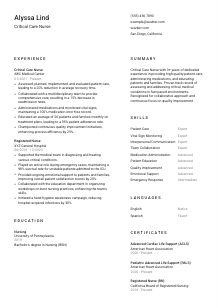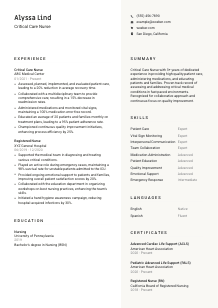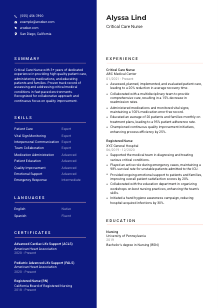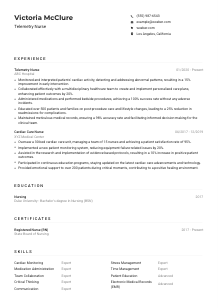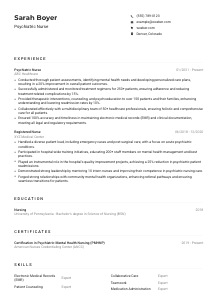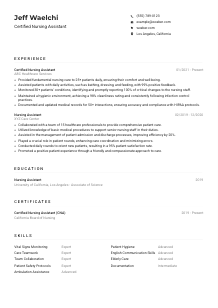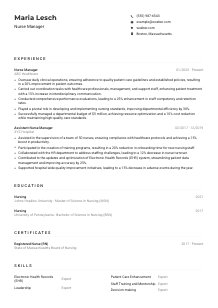Critical Care Nurse Resume Example
Navigating unpredictable health storms, but your resume feels under resuscitation? Dive into this Critical Care Nurse resume example, stitched together with the Wozber free resume builder. Grasp how to spotlight your urgent care finesse to meet job requirements, ensuring your career pulse stays as strong as your patient's!
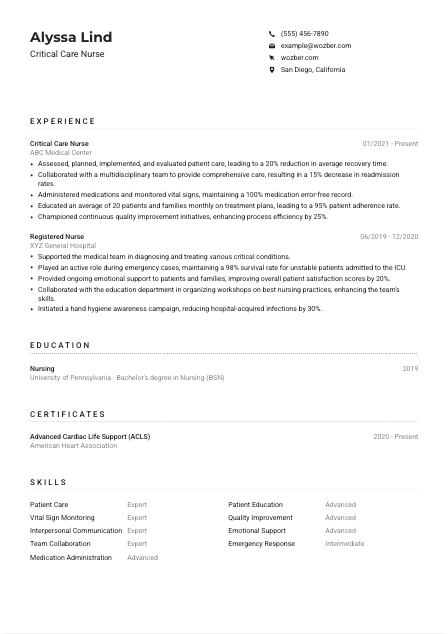
How to write a Critical Care Nurse resume?
Embarking on your journey to secure a Critical Care Nurse position requires more than just a passion for patient care; it demands a resume that speaks volumes of your expertise, dedication, and readiness to handle the most challenging situations in healthcare. With the help of Wozber's free resume builder, crafting an ATS-optimized resume tailored to your dream job becomes a seamless and empowering experience. Let's dive into creating a resume that aligns perfectly with the requirements of a Critical Care Nurse, showcasing your competence and dedication with every line.
Get ready to transform your professional narrative into one that opens doors to new opportunities.
Personal Details
Your Personal Details section should serve as the heartbeat of your resume, offering a strong and clear signal to hiring managers about who you are and how you can be reached. For a Critical Care Nurse, this section is the initial touchpoint that sets the stage for your professional story.
1. Make Your Name Memorable
Place your name prominently at the top of your resume. Consider using a slightly larger font size or bolding your name to ensure it stands out. This is the first detail hiring managers will notice, so make a strong impression from the get-go.
2. Customize with Your Job Title
Immediately below your name, clarify your professional identity by specifying "Critical Care Nurse" as your pursued job title. This direct alignment with the job posting not only showcases your career focus but also optimizes your resume for automated searches in Applicant Tracking Systems (ATS).
3. Prioritize Essential Contact Information
List your phone number and a professional email address utilizing the firstname.lastname@email.com format for a polished look. These details ensure hiring managers can easily reach out to you for the next steps in the hiring process.
4. Spotlight Your Location
Given the job description highlights a preference for applicants in San Diego, California, make sure to list your city and state. This detail immediately informs employers of your availability and potential for smooth integration into their team without the need for relocation.
5. Opt for Professional Online Presence
Including a link to a professional profile, like LinkedIn, can offer a comprehensive view of your qualifications and achievements. Ensure your online profile is current and mirrors the experiences and skills listed on your resume.
Takeaway
Crafting your Personal Details with precision sets a professional tone for your resume. It's more than basic information; it's an introduction that underscores your readiness for the Critical Care Nurse role. With Wozber's free resume builder, ensuring these details are perfectly formatted is effortless.





Experience
The Experience section is where you shine a light on your hard-won battles and triumphs in the critical care environment. It's your chance to demonstrate how your background makes you the ideal candidate for the position.
- Assessed, planned, implemented, and evaluated patient care, leading to a 20% reduction in average recovery time.
- Collaborated with a multidisciplinary team to provide comprehensive care, resulting in a 15% decrease in readmission rates.
- Administered medications and monitored vital signs, maintaining a 100% medication error‑free record.
- Educated an average of 20 patients and families monthly on treatment plans, leading to a 95% patient adherence rate.
- Championed continuous quality improvement initiatives, enhancing process efficiency by 25%.
- Supported the medical team in diagnosing and treating various critical conditions.
- Played an active role during emergency cases, maintaining a 98% survival rate for unstable patients admitted to the ICU.
- Provided ongoing emotional support to patients and families, improving overall patient satisfaction scores by 20%.
- Collaborated with the education department in organizing workshops on best nursing practices, enhancing the team's skills.
- Initiated a hand hygiene awareness campaign, reducing hospital‑acquired infections by 30%.
1. Analyze the Job Description
Begin with a thorough analysis of the job posting, identifying keywords and phrases related to responsibilities and qualifications. Look for specific skills, such as "assessing patient care" or "collaborating with multidisciplinary teams," which are crucial in highlighting your relevant experiences.
2. Present Your Professional Journey
Organize your professional history in reverse chronological order, starting with your most recent or current position. Clearly state your job title, the name of the facility, and your tenure there, providing a structured view of your career progression.
3. Reflect the Job Requirements in Your Achievements
For each position listed, craft bullet points that mirror the responsibilities and achievements relevant to a Critical Care Nurse. Use action verbs to convey your active role in patient care, team collaboration, and any quality improvement initiatives that resulted in tangible outcomes.
4. Quantify Your Impact
Whenever possible, add numbers to your accomplishments to provide context and scale of your contributions. For example, a "20% reduction in average recovery time" effectively showcases your efficiency and expertise in patient management.
5. Streamline Your Content
Include only the experiences that resonate most with the Critical Care Nurse role. Extraneous details can dilute the potency of your resume. Focus on the core aspects of your career that highlight your capabilities in a critical care setting.
Takeaway
Remember, the Experience section is your main stage. Here, you're not just listing jobs; you're narrating your journey through the intense and rewarding field of critical care nursing. Let each bullet point speak to your commitment, skill, and readiness for the challenges ahead. With Wozber, achieving an ATS-compliant resume that reflects your professional essence is within reach.
Education
In the demanding field of critical care nursing, your educational background forms the bedrock of your expertise. This section should clearly communicate your readiness and qualifications for the role.
1. Match the Job's Educational Criteria
Identify the educational requirements outlined in the job description - in this case, a Bachelor's degree in Nursing (BSN) or equivalent. Ensure your degree(s) and field of study are listed accurately to reflect your fulfillment of these expectations.
2. Simplify the Layout
Adopt a straightforward format by listing your degree, field of study, and the institution's name, followed by your graduation date. This clean layout makes it easy for hiring managers to swiftly verify your educational credentials.
3. Align Your Degree with Job Demands
Given that a BSN is a key requirement, ensure this is clearly highlighted in your resume. If you possess a Master's degree in Nursing (MSN), that's a bonus—mention it as well, as it exceeds the basic requirements and shows your commitment to furthering your nursing education.
4. Include Relevant Courses or Achievements
If you've taken specialized courses that enhance your critical care expertise, consider listing them, especially if you're in the early stages of your career. Achievements such as honors or awards during your studies can also underscore your dedication and capability.
5. Reflect on Additional Educational Milestones
Membership in nursing societies, participation in research projects, or involvement in health-related volunteer work can provide a fuller picture of your educational journey and commitment to the nursing profession.
Takeaway
The Education section of your resume does more than list degrees; it illustrates the depth of your commitment to nursing and critical care. Highlighting your educational attainment with clarity and relevance positions you as a serious candidate, well-prepared for the intricacies of critical care. With Wozber's ATS-friendly resume template, presenting your educational background has never been easier.
Certificates
In the specialized field of Critical Care Nursing, certifications serve as tangible evidence of your skills and dedication to maintaining high standards of patient care. This section is your opportunity to display those achievements that directly align with the requirements of your targeted job.
1. Pinpoint Necessary Certifications
Start by identifying certifications explicitly requested in the job posting. For a Critical Care Nurse, credentials like ACLS, PALS, and RN licensure are often non-negotiable. Listing these certifications up front validates your qualifications and assures potential employers of your competency.
2. Showcase Relevant Certifications
Display certifications that closely match the job's needs. This focus ensures your resume is succinct and impactful, presenting you as a highly qualified candidate. Highlight certifications like ACLS and PALS to underscore your readiness for critical care scenarios.
3. Include Validity Dates Where Applicable
For certifications with expiration dates, listing the achievement and expiration dates demonstrates your commitment to staying current in your field. This detail can be particularly important in showing ongoing engagement with professional development.
4. Continue Seeking Educational Growth
The healthcare field constantly evolves, and so should your knowledge base. Regularly updating your certifications and pursuing additional training reflect your dedication to excellence in patient care. Stay proactive in your educational pursuits to remain at the forefront of critical care nursing.
Takeaway
Your Certificates section is a testament to your persistence, skill, and ongoing dedication to critical care excellence. Highlighting your most relevant certifications draws a clear line connecting your qualifications to the job's requirements. With Wozber's ATS optimization features, you ensure this critical information is easily accessible to hiring managers.
Skills
The Skills section is a concise showcase of your professional competencies, offering a glimpse into the wide array of capabilities you bring to the Critical Care Nurse role. Let's ensure this section underscores your suitability for the role in a clear, ATS-friendly manner.
1. Decode and Match Skills
First, review the job posting to identify both explicitly stated and implied skills necessary for the role. Match these with your own skill set, focusing on those that directly align with the requirements of being an exceptional Critical Care Nurse.
2. Tailor Skills to Job Description
Prioritize skills that resonate with the critical care setting, like "Patient Care," "Vital Sign Monitoring," and "Interpersonal Communication." This tailored approach ensures your resume speaks directly to the needs and expectations of potential employers.
3. Organize Skill Listings
Maintain a balance between hard and soft skills to paint a comprehensive picture of your competencies. Keep your list orderly and focused, limiting it to the most relevant skills that distinguish you as a prime candidate for the Critical Care Nurse position.
Takeaway
Your Skills section should resonate with the essence of critical care nursing, reflecting a blend of technical prowess and soft skills that are vital for success in this demanding field. Highlight your unique capabilities with clarity, leveraging Wozber's ATS-friendly resume format to ensure your skills are noticeable and impactful.
Languages
In the diverse world of healthcare, your ability to communicate in multiple languages can significantly enhance patient care and collaboration. Tailor the Languages section of your resume to reflect your linguistic skills and their relevance to the Critical Care Nurse role.
1. Assess Language Requirements
Review the job description for any specific language requirements or preferences. For instance, "Must be able to express ideas clearly in English" indicates the primary language of communication. List English at the top, showcasing your fluency or native proficiency.
2. Prioritize Key Languages
If the job description emphasizes a particular language, ensure it's prominently listed. Your ability to speak the primary language without barriers is crucial in a healthcare setting for both patient interactions and team communications.
3. Include Additional Languages
Beyond the requirements, listing other languages you're proficient in can demonstrate added value, especially in regions with diverse patient populations. Your multilingual skills can set you apart as a versatile and adaptable candidate.
4. Be Honest About Your Level
Accuracy in describing your proficiency is key. Use terms like "Native," "Fluent," "Intermediate," or "Basic" to give hiring managers a clear understanding of your linguistic capabilities. This honesty ensures realistic expectations and showcases your integrity.
5. Consider the Role's Scope
Think about how your language skills fit into the broader scope of the Critical Care Nurse role. In environments where communication with patients and families from diverse backgrounds is common, your ability to speak multiple languages can be a significant asset.
Takeaway
Linguistic skills can open doors to deeper connections with patients and colleagues alike, enhancing the care environment. Present your language proficiencies as part of your holistic qualifications for the Critical Care Nurse role. With Wozber, showcasing this aspect of your professional toolkit is streamlined and effective.
Summary
The Summary section is your chance to captivate hiring managers right from the start. Here, you weave your competencies, experiences, and career aspirations into a compelling narrative that positions you as the ideal candidate for the Critical Care Nurse role.
1. Absorb the Job Essence
Begin by internalizing the job posting. Understand what makes a Critical Care Nurse invaluable to their team and how you exemplify these qualities. This deep understanding will guide the crafting of a targeted and engaging summary.
2. Open with Impact
Introduce yourself with a statement that reflects your professional identity and core competencies. For example, "Critical Care Nurse with 3+ years of dedicated experience in providing high-quality patient care..." immediately sets the tone for your depth of expertise.
3. Highlight Pertinent Skills and Achievements
In a few lines, distill your key skills and notable achievements that align with the requirements of the Critical Care Nurse position. This succinct approach keeps the reader engaged and eager to learn more about you through the rest of the resume.
4. Be Clear and Concise
Your summary should be a teaser, not a tell-all. Keep it to 3-5 sentences, inviting hiring managers to dive deeper into your resume. This brevity ensures your message is potent and memorable.
Takeaway
Think of your Summary as the opening act to the compelling story of your career. It's your chance to highlight your fit for the Critical Care Nurse role explicitly. Tailoring it with precision and passion sets a solid foundation for the narrative that unfolds in your resume. Wozber's ATS optimization aids in ensuring this key section gets the attention it deserves.
Launching Your Critical Care Nurse Journey
Congratulations on taking this detailed journey through each section of crafting an ATS-compliant resume targeted for a Critical Care Nurse position. Armed with insights and Wozber's innovative tools, you're ready to present a resume that resonates with hiring managers and distinguishes you from the competition. Remember, your resume is more than a document; it's a reflection of your dedication, skill, and potential.
Use Wozber's free resume builder, ATS-friendly resume templates, and ATS resume scanner to ensure you're leveraging every opportunity to shine. Your path to making an impactful difference in critical care nursing awaits!

- Bachelor's degree in Nursing (BSN) or equivalent;
- Master's degree in Nursing (MSN) preferred.
- Valid Registered Nurse (RN) licensure in the state of practice.
- Certification in Advanced Cardiac Life Support (ACLS) and/or Pediatric Advanced Life Support (PALS) as required.
- Minimum of 2 years of experience in critical care or ICU settings.
- Strong interpersonal and communication skills, both written and verbal.
- Must be able to express ideas clearly in English.
- Must be located or willing to relocate to San Diego, California.
- Assess, plan, implement, and evaluate patient care in the critical care setting.
- Collaborate with multidisciplinary teams to ensure coordinated and comprehensive care.
- Administer medications, monitor vital signs, and provide basic life support as needed.
- Educate patients and their families on treatment plans, post-care routines, and potential complications.
- Participate in continuous quality improvement initiatives and professional development activities.





